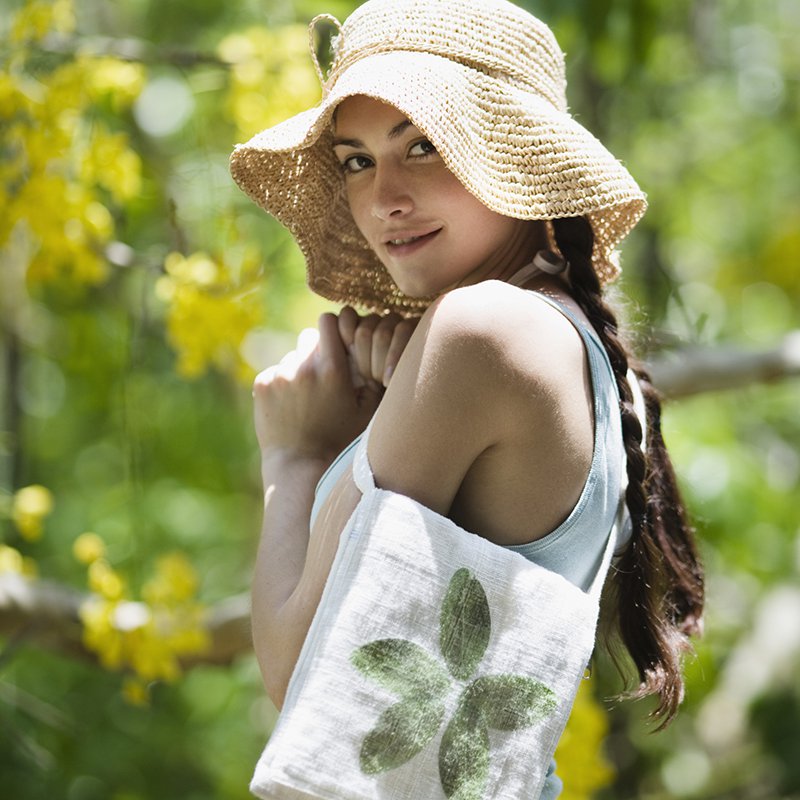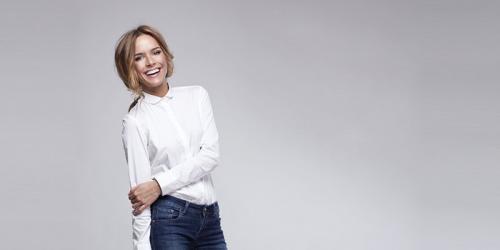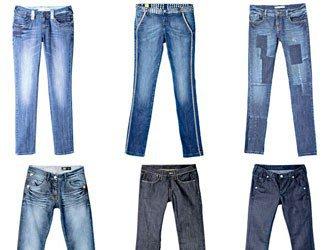What is the difference between fair and organic?
What label for a fair mode?
Is fair trade more expensive?
But what about solidarity in France?
Organic fashion: sexy and trendy!
For you, fair trade textile rhymes with nerdy poncho of the 70s? Creators compete with each other to create models where the look counts as much as the good cause: "The consumer is not fooled, explains Sébastien Kopp , founder of the Veja sneaker brand. He does not follow ethical fashion out of moral conviction, but because she is sexy, funny and hip. Charity is not a selling point, the quality of the product is a premium. " Fairtrade has a slogan that sums it up:" Because our purchases here are changing their lives there. "This form would be the solution to rebalancing the North / South relations. The 3 billion men who live on less than $ 2 a day would thus have a chance to get away ... The concept is well known in the food industry. Created in the late 1980s but organized since the early 2000s, ethical fashion aims to pay correctly the 15 to 20 million people living in cotton all over the world.
What is the difference between fair and organic?
Above all, what is the difference between fashion and fair nutrition ? If coffee or chocolate has "fair" guaranteed channels from one end of the chain to the other, the same can not be said for textiles. Only the raw material, cotton, is concerned. The complexity of the textile industry is such that few brands can control all the manufacturing steps: spinning, dyeing, weaving, making ...
Second pitfall: fair trade cotton is not necessarily organic . Certainly, the labels guarantee the absence of GMOs, but nothing says that chemicals do not enter the culture of this material a priori natural. Few brands offer both ethical and organic products . Veja sneakers are made of organic cotton (ie guaranteed without pesticides or chemical fertilizers) and natural rubber harvested on Amazonian rubber by seringueros. The brand is ecological : it has just released a model in organic leather, tanned and dyed only with the help of plants. One more that has a cost: 105 € against 85 € for a pair of classic Veja ...
What label for a fair mode?
One agrees to offer a jacket fair fashion top, but still must be certain of its provenance. Over the last year, the Max Havelaar label guarantees the cotton used by textile brands. "Our international solidarity association has a dual objective," explains Max Havelaar : "to enable producers in the South to live with their work worthily and consumers to act for sustainable development . Approximately 10% of the selling price goes to cotton producers, compared to less than 1% in the traditional system. "Recognizable with its green and blue logo, the Max Havelaar label pays 4.2 million euros to cotton producers. These families in Africa, Brazil, India, Madagascar and Peru have a number of advantages: a guaranteed minimum price of 40% to 70% higher than that of the market, reduction of intermediaries and a social finance schools, health centers, wells, roads. Today, this type of cotton concerns only 1% of the French textile market, which draws 30 billion euros a year, but it is necessary to talk about it.
What does the Max Havelaar label guarantee?
In order to achieve this, trademarks must comply with rules: to ensure a decent income for producers, to improve working conditions, to guarantee a cultivation of cotton that respects nature (neither GMO nor hazardous chemicals) and to produce quality craft. An independent company certifies the application. Each stage of cotton production is controlled: Southern producer, cotton company, importer, spinner, weaver, manufacturer. The label guarantees only the raw material, ie 80% of fair trade cotton in the yarn. Traceability is complex to establish without an integrated chain: an African cotton can pass through an importer in Senegal, be spun in Madagascar, woven in Turkey ...
Some big brands play the game (read "What guarantees the label ..."), but in moderation. Their commitment comes down to a few ethical tee shirts embedded in a classic range (Célio, Chipie, Ushuaia, Armor Lux, Cora, La Redoute, Eicher). Even designers like Vanessa Bruno and her line of organic cotton t-shirts or Jérôme Dreyfuss and her label agri-couture : their bags are made of natural leather from livestock. The more addicted will sleep in a fair couette (La Redoute) and will be delighted to know that the postal workers are equally dressed fair. Max Havelaar welcomes the good results of its 36 partners: La Redoute has sold 200,000 T-shirts on the 2005-06 season and Armor Lux nearly 40,000. A good start for these big brands who have understood their interest in surfing the wave of consumer sympathy. Indeed, "these recognized brands do not hesitate to make their communication on products that represent only 0.1% of their turnover," regrets a small producer.
Is fair trade more expensive?
These major brands, established throughout the world, have the merit of increasing the notoriety of the ethical fashion . They buy fair trade cotton, but often their initiative stops there as they continue to manufacture in their offshore factories. The improvement of the living conditions of producers in the countries of the South will probably come from small brands, such as Veja , Misericordia , Ideo or Tudo Bom ? They buy fair trade cotton and carry out their collection on the spot in order to help these artisanal co - operatives to develop . Sold online or in trendy stores, they are also distributed by fair trade pioneers like Alter Mundi .
Aurelyen, the founder of Misericordia , a clothing brand conceived in Peru, continues to make his own cartoons in his Parisian showroom while he sold his first models at Colette , Mecca of fashion in Paris. "I do everything on my own," he explains. I share my time between travels and Jerusalen Ventanilla, a shanty town north of Lima, to follow the work of the seamstress's goldsmith. "The result is high: 15,000 clothes are sold every year in the 70 outlets at worldwide. For their part, the founders of Veja have traveled quite a bit before establishing their brand in Brazil: "We found that sustainable development was above all a means for companies to become self-conscious. On the ground, it's something else. A little disappointed by this discrepancy, we decided to embark on this, integrating the notion of equitable from the start. We are permanently on site with the manufacturers. They help them to improve their living conditions while encouraging them to become independent. "At Tudo Bom ? (Going in Portuguese), the models are made by seamstresses of Cascatinha, near Rio. Collection with simple design: small dress near the body, tee-shirt or hoodie for man, woman and child between 20 and 55 € piece. "We are committed to being transparent about the production process, margins, social impact and the environment ." Since the creation of the company, seamstresses have seen their wages almost doubled and they benefit from social and of a micro-credit fund to replace or repair machines.
Why is the price higher?
Ethical clothing costs 10 to 20% more . But, Aurélyen explains, "it is the price of quality (cotton, clothing, design), and our Peruvian partners live decently." This is the cost of raw materials, paid in fine 6 to 7 times more expensive than market price, which increases the bill. In addition, volumes are low (10 to 50,000 pieces per year on average). But, on arrival, everyone is there: the small producers of the countries of the South, who improve their living conditions, like consumers of the North, who crack for quality fashion products.
But what about solidarity in France?
"It is good to help the peasants of the South, but bringing apple juice from Chile is an aberration when we know that peasant farmers in Perche are not selling their overproduction of apples," notes Véronique Lacaume , who heads Andines , one of the pioneers of fair trade in France . Some actors in the fair trade sector have therefore decided to promote the professional integration of people in difficulty in our country. This is the case of Alterna Développement , which created Fairplace , a platform common to fair trade players . In its showroom of over 500 m2, it presents a wide range of decoration and fashion ... The brands partners join their efforts and their experiences to advance the ethical approach . They benefit from common services: communication media, reception, show-rooms, handling, logistics, etc., carried out by persons undertaking a process of professional reintegration. For Jérôme Schatzman , creator of Tudo Bom ?, to be part of this platform is essential: "It is useless to try to change the world in Brazil if nothing happens for the people here. Solidarity must be played on all the links in the chain. "
For the moment, fashion is still a drop in the ocean of globalization, but growing every day a little more: one in ten French people is now a committed consumer. "We do not pretend to make the world more fair," says the creator of Tudo Bom, "but we want to contribute by concrete initiatives: our collection is one." The recalcitrant fashion victims will soon have no excuses!
Our good addresses
Alter Mundi . 41, rue du Chemin-Vert, 75011 Paris. Such. : 01 40 21 06 65.
Andines . www.andines.com
Fairplace . Tel .: 01 55 84 43 43. www.fairplace.fr
Ideo . www.ideocollection.com
Jérôme Dreyfuss . Tel .: 01 43 44 48 44. Bags for sale at Bon Marché and Printemps.
Machja . www.machja.fr
Misericordia . Tel .: 01 46 27 05 13. www.misionmisericordia.com
Fashiontic . www. modetic.com
Tudo Bom ? Tel .: 01 55 84 43 33. www.tudobom-shop.com
Veja . Tel .: 01 40 29 40 80. www.veja.fr
Also ... armor-lux.fr, celio.fr, cora.fr, laredoute.fr


